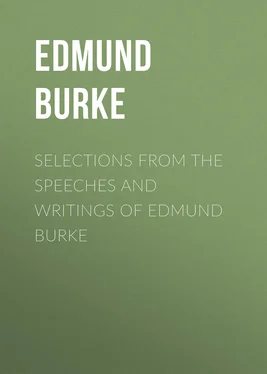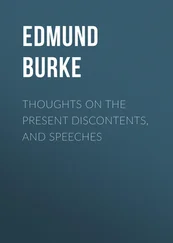Edmund Burke - Selections from the Speeches and Writings of Edmund Burke
Здесь есть возможность читать онлайн «Edmund Burke - Selections from the Speeches and Writings of Edmund Burke» — ознакомительный отрывок электронной книги совершенно бесплатно, а после прочтения отрывка купить полную версию. В некоторых случаях можно слушать аудио, скачать через торрент в формате fb2 и присутствует краткое содержание. Жанр: foreign_prose, История, Политика, literature_19, foreign_edu, foreign_antique, на английском языке. Описание произведения, (предисловие) а так же отзывы посетителей доступны на портале библиотеки ЛибКат.
- Название:Selections from the Speeches and Writings of Edmund Burke
- Автор:
- Жанр:
- Год:неизвестен
- ISBN:нет данных
- Рейтинг книги:4 / 5. Голосов: 1
-
Избранное:Добавить в избранное
- Отзывы:
-
Ваша оценка:
- 80
- 1
- 2
- 3
- 4
- 5
Selections from the Speeches and Writings of Edmund Burke: краткое содержание, описание и аннотация
Предлагаем к чтению аннотацию, описание, краткое содержание или предисловие (зависит от того, что написал сам автор книги «Selections from the Speeches and Writings of Edmund Burke»). Если вы не нашли необходимую информацию о книге — напишите в комментариях, мы постараемся отыскать её.
Selections from the Speeches and Writings of Edmund Burke — читать онлайн ознакомительный отрывок
Ниже представлен текст книги, разбитый по страницам. Система сохранения места последней прочитанной страницы, позволяет с удобством читать онлайн бесплатно книгу «Selections from the Speeches and Writings of Edmund Burke», без необходимости каждый раз заново искать на чём Вы остановились. Поставьте закладку, и сможете в любой момент перейти на страницу, на которой закончили чтение.
Интервал:
Закладка:
PATRIOTISM AND PUBLIC INCOME
Is it not the same virtue which does everything for us here in England? Do you imagine, then, that it is the land-tax which raises your revenue? that it is the annual vote in the committee of supply, which gives you your army? or that it is the Mutiny Bill, which inspires it with bravery and discipline? No! surely no! It is the love of the people; it is their attachment to their government, from the sense of the deep stake they have in such a glorious institution, which gives you your army and your navy, and infuses into both that liberal obedience, without which your army would be a base rabble, and your navy nothing but rotten timber.
All this, I know well enough, will sound wild and chimerical to the profane herd of those vulgar and mechanical politicians, who have no place among us; a sort of people who think that nothing exists but what is gross and material; and who therefore, far from being qualified to be directors of the great movement of empire, are not fit to turn a wheel in the machine. But to men truly initiated and rightly taught, these ruling and master principles, which, in the opinion of such men as I have mentioned, have no substantial existence, are in truth everything, and all in all. Magnanimity in politics is not seldom the truest wisdom; and a great empire and little minds go ill together. If we are conscious of our situation, and glow with zeal to fill our places as becomes our station and ourselves, we ought to auspicate all our public proceedings on America, with the old warning of the Church, Sursum corda! We ought to elevate our minds to the greatness of that trust to which the order of Providence has called us. By adverting to the dignity of this high calling, our ancestors have turned a savage wilderness into a glorious empire; and have made the most extensive, and the only honourable conquests, not by destroying, but by promoting the wealth, the number, the happiness of the human race. Let us get an American revenue as we have got an American empire. English privileges have made it all that it is; English privileges alone will make it all it can be.
AMERICAN PROTESTANTISM
If anything were wanting to this necessary operation of the form of government, religion would have given it a complete effect. Religion, always a principle of energy, in this new people is no way worn out or impaired; and their mode of professing it is also one main cause of this free spirit. The people are Protestants; and of that kind which is the most adverse to all implicit submission of mind and opinion. This is a persuasion not only favourable to liberty, but built upon it. I do not think, Sir, that the reason of this averseness in the dissenting churches, from all that looks like absolute government, is so much to be sought in their religious tenets, as in their history. Every one knows that the Roman Catholic religion is at least coeval with most of the governments where it prevails; that it has generally gone hand in hand with them, and received great favour and every kind of support from authority. The Church of England, too, was formed from her cradle, under the nursing care of regular government. But the dissenting interests have sprung up in direct opposition to all the ordinary powers of the world; and could justify that opposition only on a strong claim to natural liberty. Their very existence depended on the powerful and unremitted assertion of that claim. All Protestantism, even the most cold and passive, is a sort of dissent. But the religion most prevalent in our northern colonies is a refinement on the principle of resistance; it is the dissidence of dissent, and the Protestantism of the Protestant religion.
RIGHT OF TAXATION
I am resolved this day to have nothing at all to do with the question of the right of taxation. Some gentlemen startle, but it is true; I put it totally out of the question. It is less than nothing in my consideration. I do not indeed wonder, nor will you, Sir, that gentlemen of profound learning are fond of displaying it on this profound subject. But my consideration is narrow, confined, and wholly limited to the policy of the question. I do not examine whether the giving away a man's money be a power excepted and reserved out of the general trust of government; and how far all mankind, in all forms of polity, are entitled to an exercise of that right by the charter of nature. Or whether, on the contrary, a right of taxation is necessarily involved in the general principle of legislation, and inseparable from the ordinary supreme power. These are deep questions, where great names militate against each other; where reason is perplexed; and an appeal to authorities only thickens the confusion. For high and reverend authorities lift up their heads on both sides; and there is no sure footing in the middle. This point is the GREAT SERBONIAN BOG, BETWIXT DAMIATA AND MOUNT CASIUS OLD, WHERE ARMIES WHOLE HAVE SUNK. I do not intend to be overwhelmed in that bog, though in such respectable company. The question with me is, not whether you have a right to render your people miserable; but whether it is not your interest to make them happy. It is not what a lawyer tells me I MAY do; but what humanity, reason, and justice tell me I ought to do. Is a politic act the worse for being a generous one? Is no concession proper, but that which is made from your want of right to keep what you grant? Or does it lessen the grace or dignity of relaxing in the exercise of an odious claim, because you have your evidence-room full of titles, and your magazines stuffed with arms to enforce them? What signify all those titles, and all those arms? Of what avail are they, when the reason of the thing tells me, that the assertion of my title is the loss of my suit; and that I could do nothing but wound myself by the use of my own weapons?
CONTRACTED VIEWS
It is exceedingly common for men to contract their love to their country into an attachment to its petty subdivisions; and they sometimes even cling to their provincial abuses, as if they were franchises and local privileges. Accordingly, in places where there is much of this kind of estate, persons will be always found who would rather trust to their talents in recommending themselves to power for the renewal of their interests, than to incumber their purses, though never so lightly, in order to transmit independence to their posterity. It is a great mistake, that the desire of securing property is universal among mankind. Gaming is a principle inherent in human nature. It belongs to us all. I would therefore break those tables; I would furnish no evil occupation for that spirit. I would make every man look everywhere, except to the intrigue of a court, for the improvement of his circumstances, or the security of his fortune.
ASSIMILATING POWER OF CONTACT
I am sure that the only means of checking precipitate degeneracy is heartily to concur with whatever is the best in our time; and to have some more correct standard of judging what that best is, than the transient and uncertain favour of a court. If once we are able to find, and can prevail on ourselves to strengthen, a union of such men, whatever accidentally becomes indisposed to ill-exercised power, even by the ordinary operation of human passions, must join with that society, and cannot long be joined without in some degree assimilating to it. Virtue will catch as well as vice by contact; and the public stock of honest, manly principle will daily accumulate. We are not too nicely to scrutinize motives as long as action is irreproachable. It is enough (and for a worthy man perhaps too much) to deal out its infamy to convicted guilt and declared apostacy.
PRUDENCE OF TIMELY REFORM
But there is a time when men will not suffer bad things because their ancestors have suffered worse. There is a time when the hoary head of inveterate abuse will neither draw reverence nor obtain protection. If the noble lord in the blue riband pleads "not guilty" to the charges brought against the present system of public economy, it is not possible to give a fair verdict by which he will not stand acquitted. But pleading is not our present business. His plea or his traverse may be allowed as an answer to a charge, when a charge is made. But if he puts himself in the way to obstruct reformation, then the faults of his office instantly become his own. Instead of a public officer in an abusive department, whose province is an object to be regulated, he becomes a criminal who is to be punished. I do most seriously put it to administration, to consider the wisdom of a timely reform. Early reformations are amicable arrangements with a friend in power; late reformations are terms imposed upon a conquered enemy: early reformations are made in cool blood; late reformations are made under a state of inflammation. In that state of things people behold in government nothing that is respectable. They see the abuse, and they will see nothing else: they fall into the temper of a furious populace provoked at the disorder of a house of ill-fame; they never attempt to correct or regulate; they go to work by the shortest way—they abate the nuisance, they pull down the house.
Читать дальшеИнтервал:
Закладка:
Похожие книги на «Selections from the Speeches and Writings of Edmund Burke»
Представляем Вашему вниманию похожие книги на «Selections from the Speeches and Writings of Edmund Burke» списком для выбора. Мы отобрали схожую по названию и смыслу литературу в надежде предоставить читателям больше вариантов отыскать новые, интересные, ещё непрочитанные произведения.
Обсуждение, отзывы о книге «Selections from the Speeches and Writings of Edmund Burke» и просто собственные мнения читателей. Оставьте ваши комментарии, напишите, что Вы думаете о произведении, его смысле или главных героях. Укажите что конкретно понравилось, а что нет, и почему Вы так считаете.












